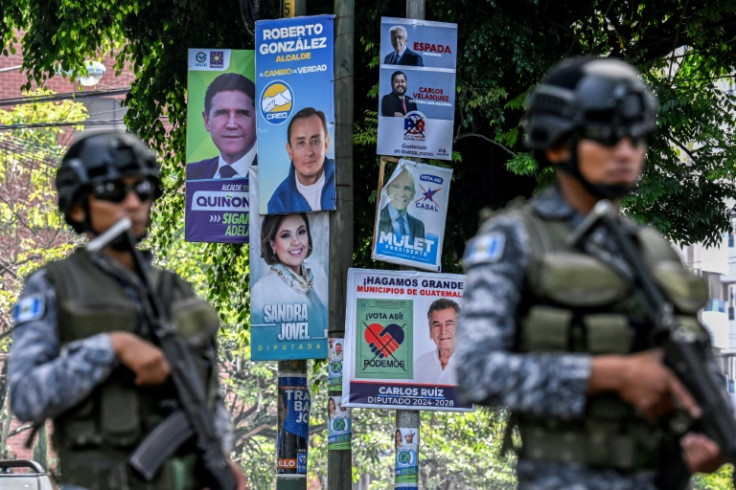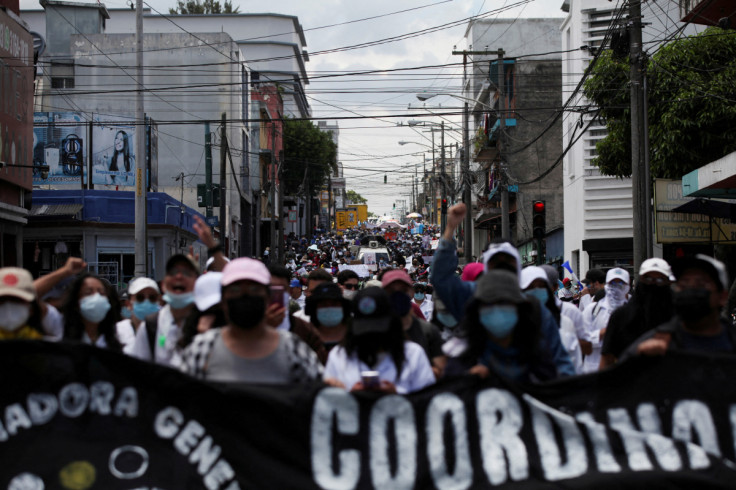Analysis: Why Guatemala's Movimiento Semilla Was Suspended?

KEY POINTS
- Last week, Movimiento Semilla Headquarters were raided by Guatemalan police
- The Supreme Electoral Court was also raided after their injunction nullified the suspension
- Legal and constitutional experts are examining the case closely
After last week's raid on the Movimiento Semilla headquarters, lawyers and constitutional experts are examining the legal standing for the attempted suspension of the party.
Following the Guatemalan police raid on the headquarters of Movimiento Semilla (Seed Movement), legal scholars reviewed the legality of the action. The raid was based on a July 12 court order that suspended the legal status of Movimiento Semilla, but the court order does not seem to have legal standing.
In an email to International Business Times, Edgar Ortiz Romero, a professor at Universidad Francisco Marroquín and Universidad del Istmo in Guatemala, said he believes the basis for the case is "highly questionable."
The lead prosecutor, Rafael Curruchiche, head of Guatemala's Special Prosecutor's Office Against Impunity (FECI), has framed it as a "case of organized crime," according to Romero, which is not normal. The given reason for suspending the legal status of Movimiento Semilla was a claim of false signatures in creating the party.
Romero told IBT that this "would normally be considered a relatively less serious crime and are typically treated as such in similar cases," but, instead, Curruchiche is treating this as an organized crime case.
Even more concerning, Romero said, is that FECI "is deliberately framing the case by arguing that they cannot ascertain the origin of the funds. This tactic seems aimed at transforming what would normally be a relatively less serious case of false signatures into a what he called a "serious" case of money laundering, invoking the the country's law against organized crime which "elevate the gravity of the charges."
This is significant as it allows a judge to "suspend a juridical person 'when they have been used to commit, in any way, an unlawful act as established in the present law,'" Romero said.
Romero said this tactic is often used by authoritarian regimes, where "rivals are often prosecuted using money laundering accusations."

If the lead prosecutor had chosen to use electoral law to suspend Movimiento Semilla Candidate Bernardo Arévalo and the party itself, the process is much longer and is forbidden during the election process.
Under Article 92 of the Electoral Law, "suspension is considered an administrative sanction, and the authority responsible for deciding on such matters is the Registry of Citizens, following a due process," and the parties being sanctioned may appeal, according to Romero.
Regarding the court order, Romero said it "appears to be arbitrary," continuing to add the "Constitutional Court issued a temporary injunction on July 13, clearly stating that the party's suspension was not applicable."
This decision, Romero said, "raises serious concerns about the impartiality of the judge who issued the order."
The Permanent Council of the Organization of American States (OAS) convened a meeting Wednesday to discuss the raid, along with the following raid on the Supreme Electoral Court.
Irma Palencia, president of the Supreme Electoral Court, spoke about her concern about the raids during a recent television interview in Guatemala. Romero said "authorities were seeking the labor record of the interim director of the Registry of Citizens, which could have been obtained through a regular request without the need for such invasive actions."
This gives the appearance the raid was "carried out with the intention of intimidating the electoral authority rather than conducting a standard investigation," Romero said.
Within the legal framework, everything being done is out of the ordinary, and follows a trend of eroding democracy in Guatemala, according to Romero, who cited a Varieties of Democracy Institute report published in March.
"The outcome of this election will undoubtedly have a profound impact on the future trajectory of our nation's democratic values and governance," Romero said.
© Copyright IBTimes 2024. All rights reserved.






















